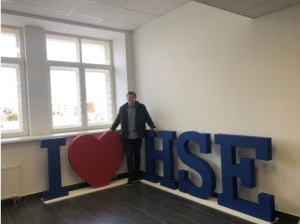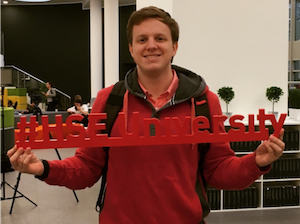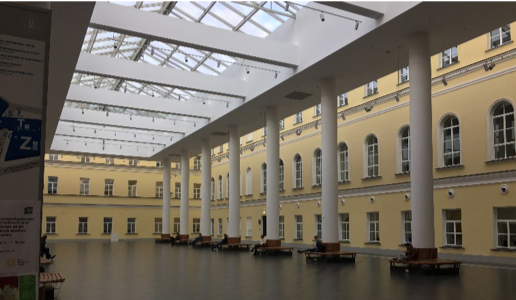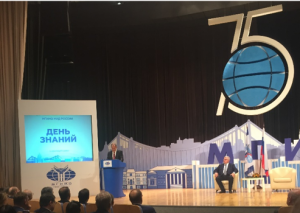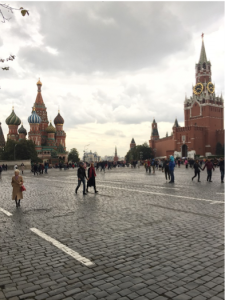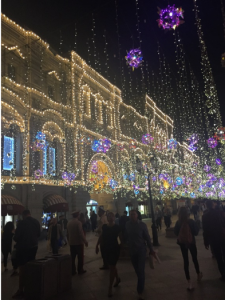Terry Cronin and Matt Kokkinos Reflect on Fall Exchanges in Moscow, Russia
By Terry Cronin and Matt Kokkinos
HSE Semester Exchange
As a second-year Master of International Business student at Fletcher, I decided to embark upon an atypical path by spending a quarter of my graduate school career in Russia. Because of my interest in further understanding international business, the political economy, tech innovation,and the former Soviet Union, a semester exchange with the National Research University Higher School of Economics (HSE) was the perfect fit for me. Although relations between the United States and Russia continue to sour, I have been thankful for this unparalleled learning opportunity at one of Russia’s premiere universities.
Despite this being my third time in Moscow, the experience here now could not be any more different. I first came to Moscow during a language program in July 2013, but the city has changed drastically since then. Although famous sites like the Kremlin and Red Square remain familiar, new areas such as the Moscow International Business Center (or “Moskva City”) boast towering skyscrapers that suggest a more technological and business-focused Russia. Extensive remodeling of many buildings and streets, as well as English signs leftover from the 2018 FIFA World Cup, show that Moscow is continuing to grow and globalize.
I previously studied abroad in Russia and the Baltic States as an undergraduate, so at first I felt quite comfortable making my way around the city and talking with the appropriate administrators and cashiers. However, as time has gone by, I have realized the need for precise language and a cleaner accent when communicating with Muscovites in order to better carry myself in the city and prevent misunderstandings. Thankfully HSE has offered language courses twice a week, which have been able to assist me in correcting my grammar and pronunciation.
In terms of the Master of International Business program at HSE, I have found it fascinating to see the effect that Fletcher has on the program here. The relationship between Fletcher and HSE has existed since 2011, and their MIB program is modeled after Fletcher’s Institute for Business in a Global Context (IGBC). Therefore, the courses are closely tied to a Fletcher equivalent. Many of the instructors teach in addition to their day job and are therefore able to offer current practical industry insights. The program and its classes are conducted on the beautiful Povkorsky Boulevard campus, which was recently renovated and offers impressive infrastructure and architecture. As a bonus, during the first week of class, we had Thursday off for the schoolwide “HSE day” in Gorky Park. There, we were greeted to large “Ninja-Warrior”-style obstacle courses, an elaborate activities fair, and an evening concert, all offering opportunities to better acquaint ourselves with our peers.
HSE’s academic environment is quite unique compared to other Russian universities because it fosters independent thought, innovation and professionalism in all their students. Many students are politically active, and advocate for more democratic practices both in Russian elections and civil society. Even though some of its students have been arrested and jailed for protesting, unlike many Russian universities, HSE does not expel students as a result. The student community often works together to offer legal assistance for the accused.
Culturally, I have also found the experience to be invaluable. It has been fascinating to meet students from all corners of the globe, representing not only familiar locations such as Italy, Germany, Mexico and China, but also Tajikistan, Turkmenistan, Estonia, Lithuania and other countries of the former Soviet Union. This will also be the first time that I will experience the harsh, infamous Russian winter, which will no doubt be challenging for someone like me, hailing from central Florida. Nonetheless, the opportunity to experience HSE in the fall has certainly been a rewarding and enthralling exchange experience so far.
MGIMO
Leaving Fletcher to study in Moscow at the Moscow State Institute of International Relations (MGIMO) for a semester was a decision which I believed was essential for a better understanding of Russian politics, seeing diplomacy from a Russian perspective, and immersing myself in a place where few Americans currently venture. Given that MGIMO is funded largely by the Russian Foreign Ministry, I hoped I would have the opportunity to gain unique insights and so far, it has been extremely rewarding. With classes taught by former KGB agents, individuals working directly with President Putin, and board members of Gazprombank, there have been numerous opportunities to gain a non-traditional perspective on intelligence, governance, and economics.
Separately, MGIMO prides itself on being the premier center for training Russia’s – and many other countries’ – future diplomats, politicians, and leaders, and the student body definitely reflects that. Students come from France, Italy, Turkey, South Korea, China, Japan, Azerbaijan, Kazakhstan, Brazil, Mexico, and India, much like at Fletcher, and there are various languages, Russian being the most predominant, being spoken in the hallways between classes and in the cafeteria at any given time. Additionally, all students are required to take a language at MGIMO: the university teaches 53 languages and holds a Guinness World Record for the most languages taught in an academic institution. I only had seven months of Russian language experience prior to arriving at MGIMO, so this definitely was useful. I would say that while my level of proficiency is still elementary, I have already begun to improve, and I think that by the time I leave, I will be much more comfortable reading and listening to Russian.
Outside of school, the MGIMO’s neighborhood of Prospekt Vernadskogo is largely residential, and sits between two metro stations which are about as far of a walk as Fletcher is to Davis. That being said, the metro in Moscow is top-notch, and a train arrives almost every two minutes, if not sooner. Regardless of what one might think about Russian bureaucracy and governance, the public transportation system is highly efficient and accessible in virtually all neighborhoods of the Moscow Metropolitain area. Plus, there is free Wi-Fi on all trains and buses and in many popular locations, making staying connected easy for visitors and Russians alike.
Moscow, however, is a city in which Wi-Fi is really not needed – for entertainment, anyway. I think of it as an open-air museum: if you look out across the city from the shopping center in Lubyanka, you can see its skyline dotted with grand churches and cathedrals, hulking Soviet apartment buildings, neoclassical revival government offices, sheer, gleaming skyscrapers, and so many other edifices which tell the story of the city through time. Plus, there are hundreds of monuments, statues, gardens, museums, and theaters which have left me with the feeling that Moscow takes preserving and illustrating its history and culture quite seriously. It does sometimes strike me as a little strange to see memorials to the USSR’s leaders so close to Orthodox churches, but I think it appropriately juxtaposes Russia’s political and cultural identity. I hope that I will get the opportunity to venture outside of Moscow and see more of Russia’s countryside and cities before the semester is finished – I am sure doing so will prove extremely rewarding.


